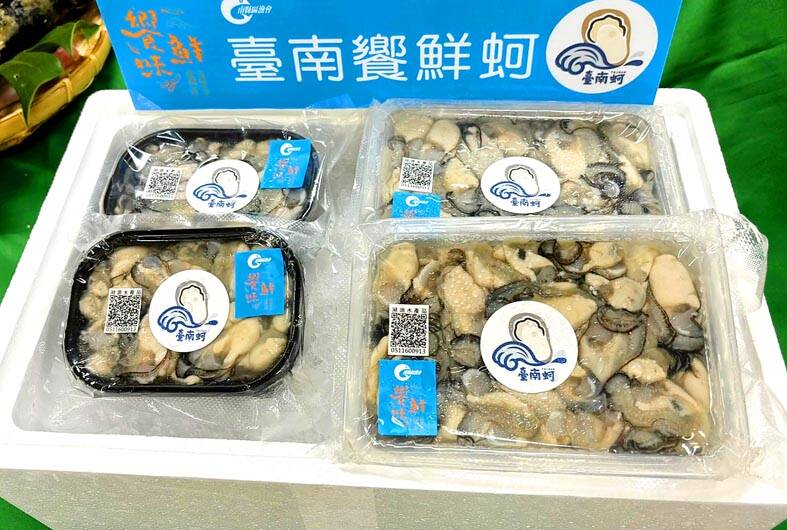The Ministry of Agriculture is planning to implement new registration, traceability and labeling measures for oysters by the end of next year, Minister of Agriculture Chen Junne-jih (陳駿季) said yesterday.
Vietnamese and Chinese oysters are being smuggled into Taiwan and sold as Taiwanese oysters, Chen said at a news conference for a sustainable seafood event.
Chinese oysters are first smuggled into the outlying islands of Kinmen and Matsu, and then transferred to Taiwan proper, Chen said.

Photo: Yang Chin-cheng, Taipei Times
Although Taiwan does not permit the import of Chinese oysters, some businesses continue to smuggle them in, making huge profits while ignoring food safety risks, he said.
The Chinese oysters are not inspected and could contain large amounts of heavy metals due to the heavy pollution in Chinese coastal waters, he added.
The ministry is cooperating with local governments to implement oyster farming registration on the islands to address the issue, Chen said, adding that they would also promote the reporting of oyster seed stocking volumes to ensure that oysters are locally produced.
The ministry has decided to implement an origin labeling and traceability system for oysters produced in Taiwan by the end of next year, shortened from an original three-year timeline, he said.
Plans would be put in place to include oysters in the same product regulations governing Taiwanese tea, he added.
The Fisheries Research Institute’s technology can already distinguish between Vietnamese oysters and Taiwanese oysters, but as Taiwanese and Chinese oysters are produced in a similar environment, the identification technology needs to be improved, Chen said.
The ministry also plans to implement farming registration procedures for other key agricultural products, and farmers seeking disaster relief assistance or government subsidies would have to comply with registration requirements, Chen said.
Starting next year, the ministry plans to systematically enforce policies to ensure a balance between production and marketing of agricultural products, he said.

Taiwan is to have nine extended holidays next year, led by a nine-day Lunar New Year break, the Cabinet announced yesterday. The nine-day Lunar New Year holiday next year matches the length of this year’s holiday, which featured six extended holidays. The increase in extended holidays is due to the Act on the Implementation of Commemorative and Festival Holidays (紀念日及節日實施條例), which was passed early last month with support from the opposition Chinese Nationalist Party (KMT) and Taiwan People’s Party. Under the new act, the day before Lunar New Year’s Eve is also a national holiday, and Labor Day would no longer be limited

COMMITMENTS: The company had a relatively low renewable ratio at 56 percent and did not have any goal to achieve 100 percent renewable energy, the report said Pegatron Corp ranked the lowest among five major final assembly suppliers in progressing toward Apple Inc’s commitment to be 100 percent carbon neutral by 2030, a Greenpeace East Asia report said yesterday. While Apple has set the goal of using 100 percent renewable energy across its entire business, supply chain and product lifecycle by 2030, carbon emissions from electronics manufacturing are rising globally due to increased energy consumption, it said. Given that carbon emissions from its supply chain accounted for more than half of its total emissions last year, Greenpeace East Asia evaluated the green transition performance of Apple’s five largest final

Taiwan is to extend its visa-waiver program for Philippine passport holders for another year, starting on Aug. 1, Minister of Foreign Affairs Lin Chia-lung (林佳龍) said on Friday. Lin made the announcement during a reception in Taipei marking the 127th anniversary of Philippine independence and the 50th anniversary of the establishment of the Manila Economic and Cultural Office (MECO) in Taiwan, the Ministry of Foreign Affairs said. The decision reflected Taiwan’s commitment to deepening exchanges with the Philippines, the statement cited Lin as saying, adding that it was a key partner under the New Southbound Policy launched in 2016. Lin also expressed hope

Temperatures in New Taipei City’s Sindian District (新店) climbed past 37°C yesterday, as the Central Weather Administration (CWA) issued heat alerts for 16 municipalities, warning the public of intense heat expected across Taiwan. The hottest location in Taiwan was in Sindian, where the mercury reached 37.5°C at about 2pm, according to CWA data. Taipei’s Shilin District (士林) recorded a temperature of 37.4°C at noon, Taitung County’s Jinfeng Township (金峰) at 12:50 pm logged a temperature of 37.4°C and Miaoli County’s Toufen Township (頭份) reached 36.7°C at 11:40am, the CWA said. The weather agency yesterday issued a yellow level information notice for Taipei, New